 Credit: US Mission Geneva
Credit: US Mission Geneva Representatives from countries including the UK, US, Germany, Belgium, and Holland addressed concerns over the law to Hungary's minister for social inclusion Zoltan Balog, asking for clarifications and assurances over its implementation.
The law, which came into effect on 1 January, the same day that Hungary began its six-month presidency of the European Union, requires all media to register with government authorities and gives the country's state-owned media body, the National Media and Infocommunications Authority (NMHH), the power to fine broadcasters and newspapers for violating "public interest, public morals or order".
The NMHH, which is comprised entirely of members of the ruling Fidesz party, is also responsible for deciding if printed or broadcast content is "balanced" and imposing sanctions on media organisations for breaching the legislation. The new law will be fully enforced from 1 July, when sanctions come into effect.
US delegate John C. Mariz criticised Hungary for "a departure from the Hungarian tradition of multi-party appointments to the media regulatory board, which raise concerns over strict regulation and limitations on freedom of expression". Mariz called on Hungary to "fully comply with its obligations related to freedom of expression, including for members of the press".
UK deputy ambassador Philip Tissot recommended amendments to Hungary's law and asked for "further clarification of how the independence of the media authority and the media council will be guaranteed and on what basis penalties will be imposed from 1 July".
Tissot also called on the country "monitor the function of its media
bodies and application of penalties to be sure they remain separate from outside influence".
Balog acknowledged the concern of the various delegations over the law, but did not take the time to respond to the individual points raised.
"We pay special attention to concerns over the media law'" he said. "We have been available to each international actor that has raised such concerns, and we always give information on our legislature and our media system."
Referring to several amendments already made to the law at the request of the European Commission, Balog said: "I believe is unparalleled in the international practice that Hungary adopted recommendations of the European Commission in two weeks. We continuously monitor the action of the media law, and we pay special attention to comments therabout.
"As I said in my introductory speech, we are ready to work on the freedom of information and the plurality of the media."
Hungary was forced to make amendments to the initial draft of the legislation after it was rejected by the European Parliament for not meeting the the Audiovisual Media Services (AVMS) Directive and the Charter of Fundamental Rights (Article 11 on freedom of expression).
A vote on the subsequent amendments had to be delayed after MEPs from several parties complained that they had not had time to assess them and did not believe that they went far enough to guarantee proper freedom of the press.
Image by US Mission Geneva on Flickr. Some rights reserved
Free daily newsletter
If you like our news and feature articles, you can sign up to receive our free daily (Mon-Fri) email newsletter (mobile friendly).
Related articles
- #JournalismMatters: The challenges of journalism in exile
- What to do if you are threatened with a SLAPP lawsuit
- IMPRESS launches dispute resolution services to make justice affordable
- WAN-IFRA: Five challenges to press freedom
- Economics woes affecting UK press freedom, RSF World Press Freedom Index finds









